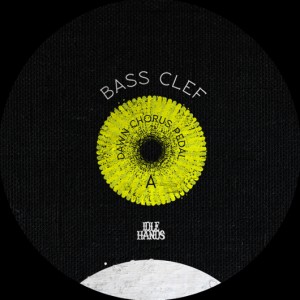Bass Clef “Dawn Chorus Pedal” b/w “You Don’t Know Don’t You Know”
April saw Bass Clef (a.k.a. Ralph Cumbers) quietly release his best LP to date in […]

April saw Bass Clef (a.k.a. Ralph Cumbers) quietly release his best LP to date in the form of Reeling Skullways, which dropped via Bristol’s esteemed Punch Drunk label. Standing at a considerable distance from both Punch Drunk’s sound and his own, the record found Cumbers placing his trademark squelching, alien synth freakouts on futurist house backdrops. While its producer excitedly referenced everything from acid house to Radiophonics with a live, mistakes-in flair, he also managed to keep it sounding immaculately composed throughout. “Dawn Chorus Pedal” b/w “You Don’t Know Don’t You Know,” a new 12″ released via Idle Hands, another Bristolian imprint, is a suitable if less exuberant follow-up.
The a-side owes a lot to its titular chorus pedal, which lends its languid synths a chiming, wistful quality. Underneath, Cumbers works out a vaguely tropical house rhythm, led by detuned toms and fits of bashing open hi-hats. While the track’s bassline has the kind of cutting, needly funk that pervaded Reeling Skullways, its other elements play out as a distinctly warped cousin to the neo-Balearic likes of Blondes, conjuring images of watching summer disappear (or reappear, given the title) over the horizon. On the flip, Cumbers hews closer to Bristol. “You Don’t Know Don’t You Know” is marked by a measured, pitchshifted repetition of its mouthful of a title. There’s hardly a corner of the track in which it doesn’t feature, and its constant presence is a bit trying. Still, Cumbers weaves it a compelling backdrop—its kinked, pressurized rhythm is akin to the spare patterns employed by his contemporaries Livity Sound, and he peppers it with clanging bells, squalling arpeggios, and his signature wobbly bass.
As well laid out as Reeling Skullways was, Dawn Chorus Pedal betters it in terms of polish. By the same token, much of the album’s singular wildness is traded for a more conservative, possibly more mixable approach. Still, conservative for Cumbers is pretty extreme for most producers. He may have returned from April’s space mission, but he clearly has not finished testing his machines’ outer limits.

